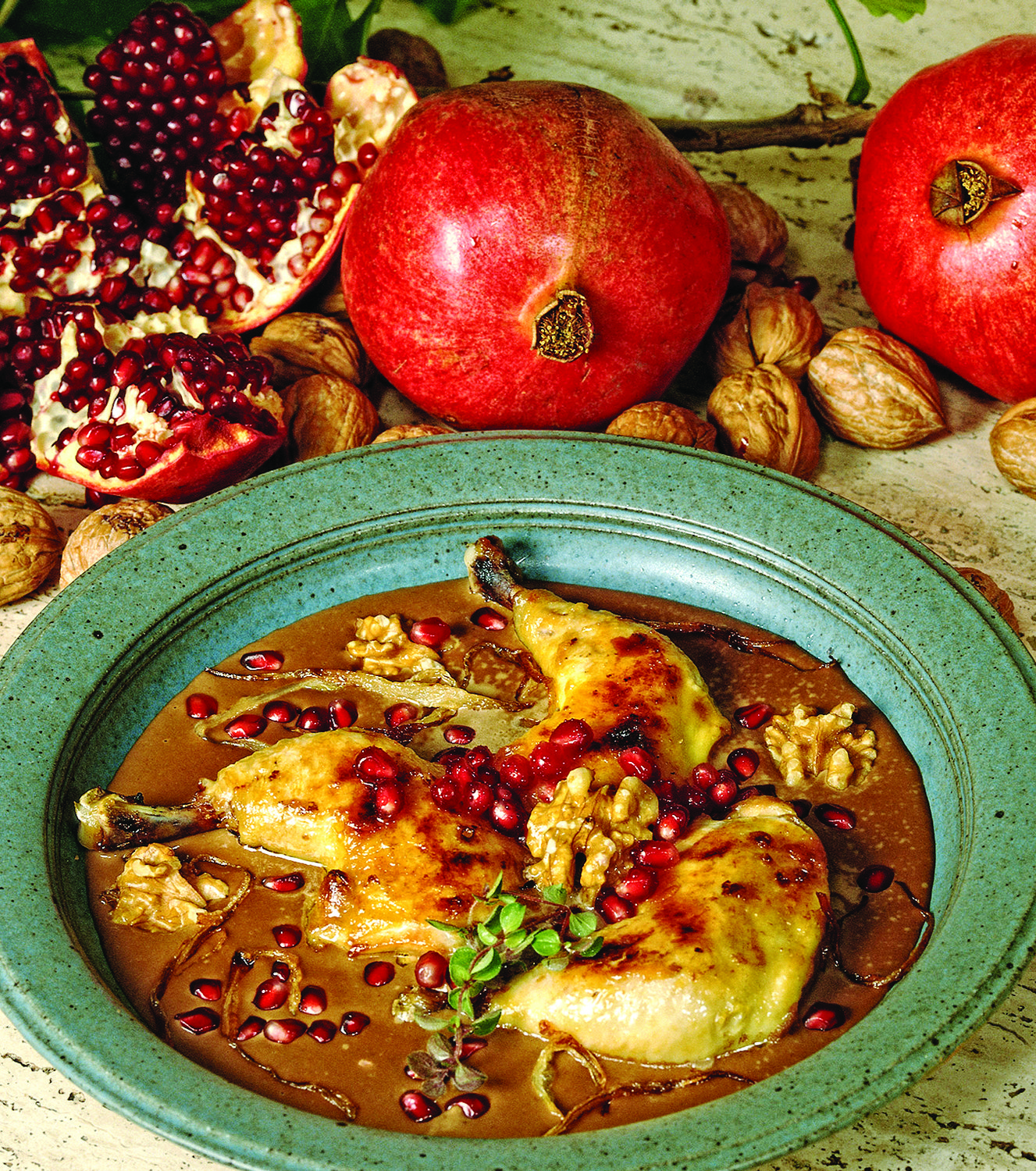Beyond tzimmes: a memorable Passover stew
Passover has always been my favorite holiday. Each year, my grandmother was proud to host two well-attended seders – there were never fewer than 18 people at our tables each night. I loved it when the house was filled with the sound of so many friends and family. I loved the way my grandfather led each seder, even though his telling of the story sometimes went so long that some years, we wouldn’t eat until 11 p.m.! That never bothered me, though, because I could always sneak into the kitchen to steal matzah balls (they were sinkers, as dense as plutonium).
The food…that’s always been my favorite part of my favorite holiday. Now, I don’t mean those weird, canned macaroons, but rather the festive meal itself. Year after year, Nana’s brisket and haroset were the stars of the show, but I always went for her tzimmes. It had a melt-in-your-mouth texture and its sweetness was tempered by the fatty richness of flanken, of which there was never enough. My cousins and I used to playfully bicker over who would get the big pieces.
Nana eventually got too old to make Passover and no one else could get her tzimmes just right, even though she still supervised the kitchen. I thought I would never taste that dish again. Some years later, when Nana was in her final days, I returned to New York to be with family. We went to dinner at a Persian restaurant, where I ordered the fesenjan, stewed chicken with walnuts and pomegranate. The first taste caused a flood of memories. Magically, with no ingredients in common, it tasted exactly like Nana’s tzimmes!
In that simple, Proustian moment, in regaining something lost for years, I was acutely aware that we would soon lose Nana. When she died several days later, every member of the family had memories of her that would last a lifetime. For me, my memories of Nana will always be inextricably linked to my memories of Pesach.
The following recipe comes from Persian food expert Najmieh Batmanglij. Fesenjan comes from a tradition other than Ashkenazi and Sephardic; it is not a distinctly Jewish dish, but it is well-known to the Mizrahi Jewish community. The recipe and photo are reprinted with permission from Food of Life: Ancient Persian and Modern Iranian Cooking and Ceremonies, by Najmieh Batmanglij, © 1986, 2019 Mage Publishers www.mage.com
Pomegranate Khoresh with Chicken
Makes 4 servings
Preparation time: 30 minutes
Cooking time: 1 hour and 30 minutes
Ingredients
2 pounds (900g) butternut squash, peeled and cut into 2-inch/5cm cubes
6 tablespoons oil, butter, or ghee
2 large onions, peeled and thinly sliced
1/2 pound (2 cups/225g) shelled walnuts
1 teaspoon sea salt
1/4 teaspoon freshly ground pepper
1/4 teaspoon turmeric
1/2 teaspoon cinnamon
2 teaspoons ground cardamom
4 cups (960ml) pure pomegranate juice
1 teaspoon pomegranate molasses
1/4 teaspoon ground saffron dissolved in 1 tablespoon water
2 pounds (900g) chicken legs, cut up
1 teaspoon grape molasses or sugar (if pomegranate juice too sour)
Garnish
Arils of 1 fresh pomegranate
2 tablespoons walnuts
Method
1. To roast the butternut squash: Preheat the oven to 400°F (200°C). In a sheet pan lined with parchment paper, place the butternut squash, 2 tablespoons oil, 1/2 teaspoon salt and 1/2 teaspoon pepper. Toss well and spread evenly. Bake for 15 minutes. Set aside.
2. In a Dutch oven, heat 2 tablespoons oil over medium heat until very hot, and sauté the onions until golden brown. Add the walnuts and sauté for 1 minute. Remove from heat and transfer to a food processor. Add the salt, pepper, turmeric, cinnamon, cardamom, and pulse until grainy. Add 1 cup pomegranate juice, the pomegranate molasses, and saffron-rose water, and mix well to create a creamy paste.
3. In the Dutch oven, heat 2 tablespoons oil over medium heat and sauté the chicken until golden brown. Add the walnut paste and half the roasted butternut squash, and the remaining pomegranate juice, stirring gently. Cover and simmer over low heat for 1 1/2 hours, stirring occasionally with a wooden spoon to prevent burning.
5. The khoresh should be sweet and sour and have the consistency of heavy cream. Adjust to taste by adding pomegranate molasses for sourness or grape molasses for sweetness. If the sauce is too thick, thin it with more pomegranate juice.
6. Transfer the khoresh from the Dutch oven to a deep, ovenproof casserole. Cover and place in a warm oven until ready to serve. Just prior to serving, garnish with the remaining roasted butternut squash, and sprinkle with fresh pomegranate arils and walnuts. Serve with saffron-steamed rice.
Nush-e Jan!
Variations:
Caspian-Style Pomegranate Khoresh with Fish – Eliminate the chicken in step 3 and replace it with 2 pounds/900g of white fish fillets (bones removed), cut into 3-inch/7.5cm lengths and seared in 2 tablespoons oil in a wide skillet over medium- high heat. Add it to the khoresh in step 6.
Pistachio Khoresh-e Fesenjan – In Kerman, walnuts are replaced with raw pistachio kernels to make a pistachio fesenjan.
Pomegranate Khoresh with Roasted Duck – Rub a duck, inside and out, with 1 tablespoon salt, 1 tablespoon black pepper, and 2 teaspoons turmeric. Stuff it with 4 cloves garlic and 4 spring onions, and roast at 350 degrees for 3 hours. Meanwhile, make the khoresh above without the chicken. Serve the duck with the khoresh.
Vegetarian – Eliminate the chicken from the ingredients. Everything else remains the same.
MICHAEL SCHEMAILLE writes for Jewish Rhode Island and the Jewish Alliance of Greater Rhode Island. Nastaran Sadr, of the David C. Isenberg Early Childhood Center at the Dwares Jewish Community Center, provided invaluable assistance with this article.








